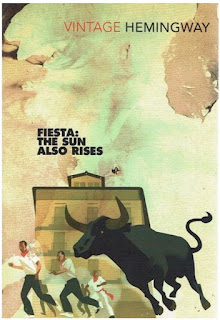Fiesta: The Sun Also Rises
There must be something crippling in writing about Hemingway. The temptation would be write a review, and then cross everything out, and just have a sentence left (in tribute to the Iceberg theory etcetera). So, in keeping with this spirit, I will try to say very little about the book. Sticking to the facts – I am on my fourth Hemingway book over the last year or two, and in this order: A Moveable Feast, The Snows of Kilimanjaro, For Whom the Bell Tolls, Fiesta: The Sun Also Rises. I’ve enjoyed them all immensely. If I had to pick a favourite so far, it would be reading about Robert Jordan’s life in the hills during the Spanish Civil War. There, it seems to me, the writer-expatriate figure of the stories meets his match in the monumental events of the time.
The
first half of “Fiesta” takes us into the 1920s expatriate life of writers and
their waiters (or waiters and their writers). The narrator, Jake Barnes, is
part of the action but not as caught up in the rivalries as his companions – a
war injury means that he can only love the beautiful ‘Brett’ (Lady Ashley) in
the platonic sense, while Robert Cohn makes his play for her affections (and
thus later is made foolish around her lover Mike, and afterwards her matador, the young
Romero (as the story moves to Spain and Pampalona in Part Two). Another
character, Bill, tells Jake:
‘You’re an
expatriate. You’ve lost touch with the soil. You get precious. Fake European
standards have ruined you. You drink yourself to death. You become obsessed
with sex. You spend all your time talking, not working. You are an expatriate,
see? You hang around cafés’ (p.100).
Jake
responses, ‘It sounds like a swell life … when do I work?’ – an excellent
retort. Jake has something of Robert Jordan’s stoicism and steadiness in the
face of the chaos around him; but there isn’t yet a Spanish war to fight. So
Jake is content to fish, and work when he must, and observe others, and love
Brett truly, seen in his action in coming to her aid in Madrid when she needs
him, despite everything.
Here’s
a bit about waiters (since I’ve just quoted something about writers).
When the Fiesta is over, and Jake is by himself in Bayonne, he thinks about the
differences between France and Spain when it comes to the cultural
practices of tipping:
‘The waiter
seemed a little offended about the flowers of the Pyrenees, so I overtipped
him. That made him happy. It felt comfortable to be in a country where it is so
simple to make people happy. You can never tell whether a Spanish waiter will thank
you. Everything is on such a clear financial basis in France … No one makes
things complicated by becoming your friend for any obscure reason. If you want
people to like you you have only to spend a little money’ (p.204).
Perhaps
an odd quotation to take from the book but it illustrates my point about
writers and waiters (and, for that matter, Bill’s point to Jake). Jake is being ironic, of course, since he obviously values such relationships with Spanish people and wishes to move beyond transactions. To get that you need to read between the lines - as they say - he speaks Spanish; tries to have an authentic understanding about bullfighting; is - at times - embarrassed by his friends. Jake also allows certain things to happen which might be in his power to prevent, such as Romero's drinking session with the decadent Americans (and Brett ...). Jake drinks too much, too. He's no saint; he's just not such a bull.
Indeed, the rest of the action involves bulls and steers – and the trick, it seems to me, is to know whether you are ready for the ring, and whether you want to fight it out, or just sit back and write about it. If what you are going to do is write, perhaps it is best to do so from the point of view of one who has an excuse not to join the fray – a modest war veteran with certain injuries that make him kindly and philosophical, while his friends remain dissatisfied, drunken expatriates that (apparently) have come to typify the Lost Generation. I was hoping to avoid that phrase, but it has come out in the end. I’d rather leave with Brett’s lament to the man she probably does love: ‘Oh, Jake, we could have had such a damned good time together’. If only, and all that this implies. Or, as Hemingway has Jake so simply put it, ‘Isn’t it pretty to think so?’.
Indeed, the rest of the action involves bulls and steers – and the trick, it seems to me, is to know whether you are ready for the ring, and whether you want to fight it out, or just sit back and write about it. If what you are going to do is write, perhaps it is best to do so from the point of view of one who has an excuse not to join the fray – a modest war veteran with certain injuries that make him kindly and philosophical, while his friends remain dissatisfied, drunken expatriates that (apparently) have come to typify the Lost Generation. I was hoping to avoid that phrase, but it has come out in the end. I’d rather leave with Brett’s lament to the man she probably does love: ‘Oh, Jake, we could have had such a damned good time together’. If only, and all that this implies. Or, as Hemingway has Jake so simply put it, ‘Isn’t it pretty to think so?’.
(See also my thoughts on A Moveable Feast, For Whom the Bell Tolls).




Comments
Post a Comment